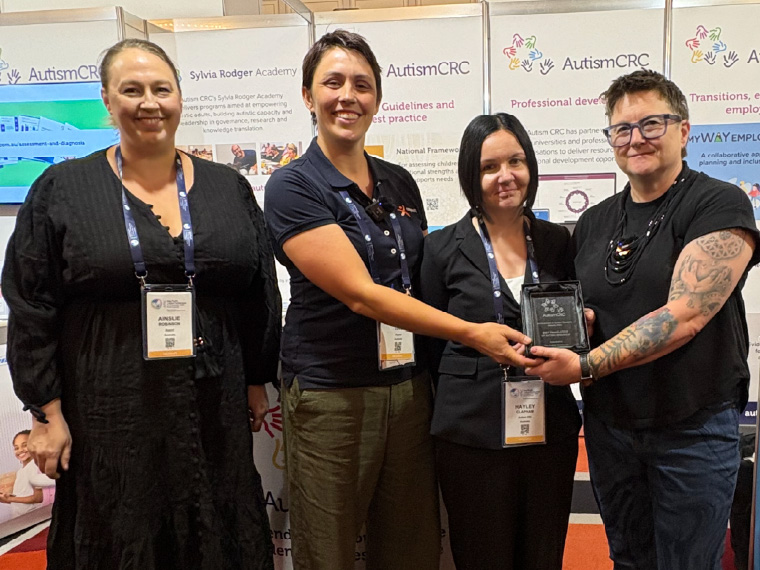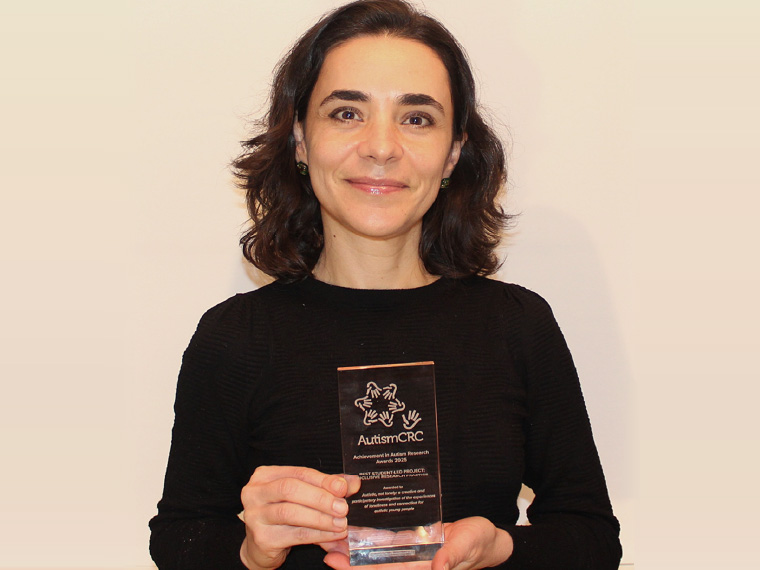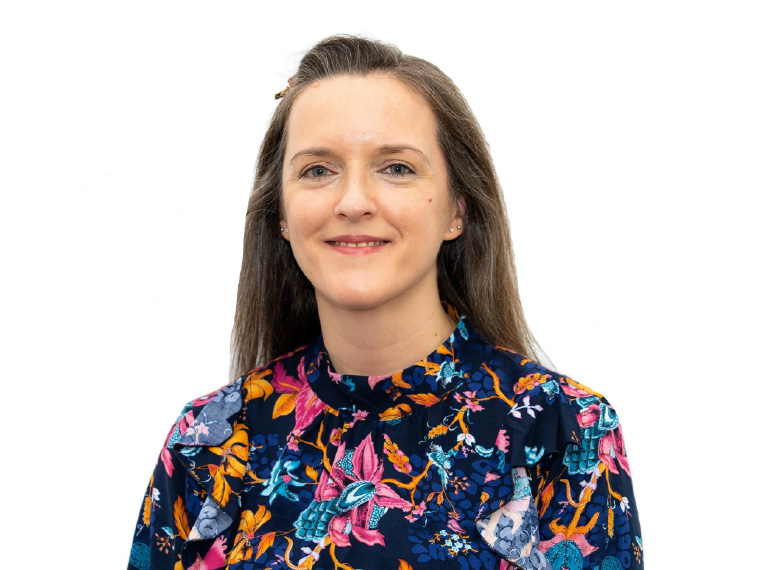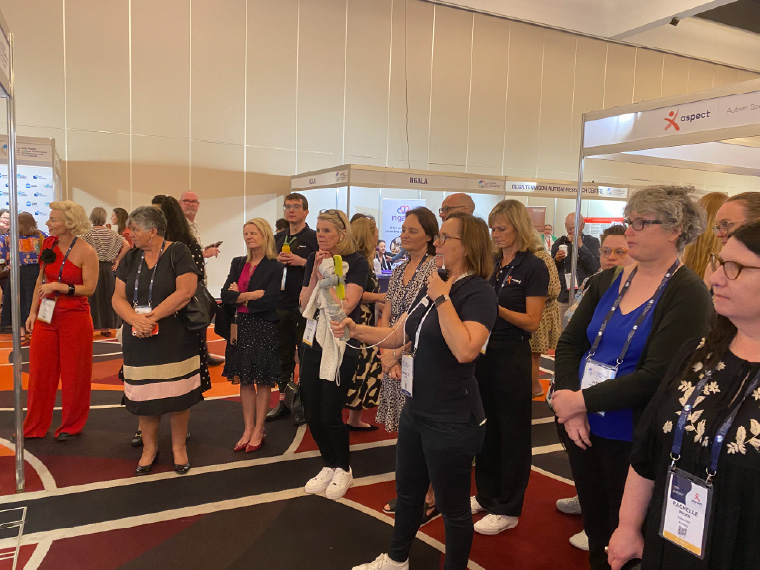2025 Autism CRC Awards for Achievement in Autism Research
We're proud to announce the recipients of the 2025 Autism CRC Awards for Achievement in Autism Research.
Three projects have received recognition for their outstanding commitment to inclusive research practices and translation of autism research:
- The Autistic Pregnancy and Parenthood Hub: Translating co-produced research into community impact
- Optimising general practice support for autistic adults: A realist review
- Autistic, not lonely: A creative and participatory investigation of the experiences of loneliness and connection for autistic young people.
This year, to celebrate the 10th anniversary of the awards we introduced a new award for best student-led project (inclusive research or translation). The awards were announced at Asia Pacific Autism Conference 2025 in Perth on Friday, 14 November 2025. The awards acknowledge initiatives that exemplify Autism CRC’s vision, mission and values. In particular, they recognise achievements in inclusive research practice and the translation of autism research into practice, products, policy and programs that benefit the autistic and broader autism communities. Autism CRC received a high number of applications both nationally and internationally. The awardees demonstrated high levels of engagement with autistic individuals and the autism community across three very diverse projects that have the capacity to realise long term benefits.
We congratulate all of our 2025 award recipients and look forward to seeing the positive impact of their work.
Translation of autism research into practice award
The Autistic Pregnancy and Parenthood Hub: Translating co-produced research into community impact
Led by Dr Abbey Love, Autism Spectrum Australia (Aspect)
This project undertook research designed to translate into meaningful practice guidelines and raise visibility for Australian autistic parents navigating the challenging period of pregnancy and early parenthood. A team of five advisors, including two perinatal clinicians, conducted a series of rapport-building sessions centred on sharing birth stories, listening and mutual learning to guide the research design and development.
Together the team created two interconnected qualitative studies that aimed to:
- Explore the experiences of autistic Australian individuals throughout the stages of pregnancy and early parenthood.
- Understand the perspectives of clinicians working in the perinatal space, with a focus on what supports good care and what creates barriers.
Both studies generated rich insights into the experiences of autistic parents and the perspectives of healthcare professionals. Together, they highlighted the strengths and resourcefulness of autistic parents, the importance of affirming supports, and the systemic barriers that often undermine equitable care. These barriers include stigma and discrimination for autistic clinicians, unclear pathways of disclosure, limited to no training for clinicians, and policies that indirectly exclude autistic people. These findings underscored the need for practical, evidence-informed resources to guide healthcare providers and to validate the lived experiences of autistic people. The benefits of this work extend to both autistic individuals (who gain access to affirming, relevant, and trustworthy resources), and to healthcare providers, who now have access to evidence-based guidance to improve their practice. The key outcome of this work was the creation of the Autistic Pregnancy and Parenthood Hub, an accessible, evidence-informed resource shaped by both research and the lived experience of the autistic advisory team and now serves as a virtual space for both parents and professionals seeking resources.
"The Autistic Pregnancy and Parenthood Hub is accessible, evidence-informed, and shaped by lived experience. Its impact spans professional training, media coverage, and academic contributions, raising awareness and improving practice." – Project reviewer
Inclusive research practice award
Optimising general practice support for autistic adults: a realist review
Led by Dr Kelly Birtwell (University of Manchester, UK)
General practice is often the first point of contact for patients, autistic people face barriers to healthcare, report lower satisfaction with healthcare, and have more unmet health needs than non-autistic people. This project aimed to create guidance for general practice staff and autistic adults to improve access to and engagement with general practice care for autistic adults with and without intellectual disabilities (ID) throughout their lives. In addition, the research will map existing evidence and identify areas where evidence is lacking, providing a basis for future research activity. A realist (theory-driven systemic) review was conducted, informed by the principles of scientific realism. Stakeholders were involved in each stage of the review including autistic individuals, family members and healthcare professionals (including GPs). The team examined existing evidence to develop a ‘programme theory’ to explain how, why, and to what extent general practice supports autistic adults with and without ID throughout their lifespan. The team also identified resources used by general practice staff to inform their approach to working with autistic adults to help them navigate contact with general practice. Evidence was identified from bibliographic databases (qualitative, quantitative, and mixed methods articles), grey literature, and sources suggested by stakeholders.
"Sound methodology and has already had real world impact, aiming to improve healthcare engagement for autistic individuals. Included autistic people throughout the process, including choosing the initial research question". – Project reviewer
Best student-led project award: Inclusive research practice
Autistic, not lonely: a creative and participatory investigation of the experiences of loneliness and connection for autistic young people
Led by PhD student Luciana Lisboa White (York St John University)
This project aimed to create a suitable loneliness scale which includes autistic perspectives of loneliness and connection, and to include autistic voice to literature by updating and extending neuronormative understandings of loneliness in collaboration with members of the autistic community.
The main outcome of this project was the development of a measuring instrument suitable for autistic individuals to provide an important tool to capture and assess experiences of loneliness. This will give autistic young people and those who support them a more accurate picture of their subjective experiences of loneliness. The scale can be used to identify nuances of loneliness that go beyond the social and emotional domains, as its subscales give information of different dimensions of loneliness as described by autistic young people (global, social, emotional, existential, experiential, and positive loneliness). This first assessment can lead to conversations that can clarify how strong feelings of loneliness are, how often they are felt, and contexts (which situations contribute to the growth / decline of these feelings). The scale can be useful to inform multidisciplinary practice including psychological formulation of need, and can be used as an evaluation tool by therapists, teachers, and parents who are focused on improving quality of life. The project also included the exploration of personal strategies that promote wellbeing and connection. Activities such as engaging with fictional characters, personal interests or pets, are a few examples of personal strategies foregrounded by autistic young people. These could work as interventions to promote mental health, but most importantly, they can inform educational, social, and therapeutic systems, making personal strategies more widely accepted and understood by all as authentic tools that are meaningful for autistic people.
"This project displayed appropriate methodology, and significant community need and impact. Clear engagement with autistic co-producers right from the beginning of the project and including autistic young people which are a group often overlooked". – Project reviewer
Once again, congratulations to all involved in these important research projects.




First image: Dr Abbey Love accepting the award for The Autistic Pregnancy and Parenthood Hub
Second image: Luciana Lisboa White accepting the award for Autistic, not lonely: a creative and participatory investigation of the experiences of loneliness and connection for autistic young people
Third image: Dr Kelly Birtwell will accept the award for Optimising general practice support for autistic adults: a realist review
Fourth image: APAC 2025 attendees